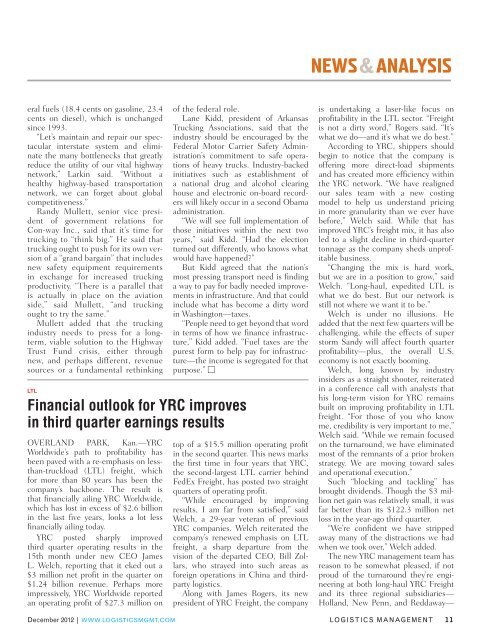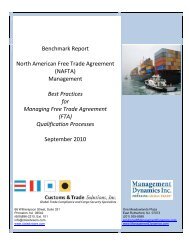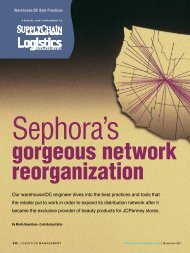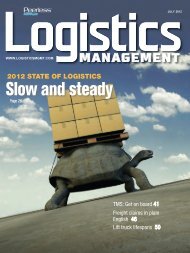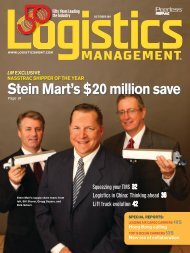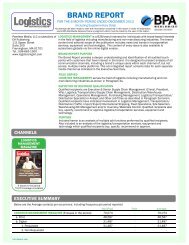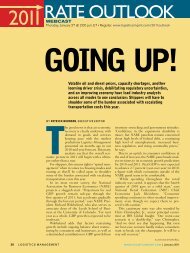Download - Logistics Management
Download - Logistics Management
Download - Logistics Management
You also want an ePaper? Increase the reach of your titles
YUMPU automatically turns print PDFs into web optimized ePapers that Google loves.
eral fuels (18.4 cents on gasoline, 23.4<br />
cents on diesel), which is unchanged<br />
since 1993.<br />
“Let’s maintain and repair our spectacular<br />
interstate system and eliminate<br />
the many bottlenecks that greatly<br />
reduce the utility of our vital highway<br />
network,” Larkin said. “Without a<br />
healthy highway-based transportation<br />
network, we can forget about global<br />
competitiveness.”<br />
Randy Mullett, senior vice president<br />
of government relations for<br />
Con-way Inc., said that it’s time for<br />
trucking to “think big.” He said that<br />
trucking ought to push for its own version<br />
of a “grand bargain” that includes<br />
new safety equipment requirements<br />
in exchange for increased trucking<br />
productivity. “There is a parallel that<br />
is actually in place on the aviation<br />
side,” said Mullett, “and trucking<br />
ought to try the same.”<br />
Mullett added that the trucking<br />
industry needs to press for a longterm,<br />
viable solution to the Highway<br />
Trust Fund crisis, either through<br />
new, and perhaps different, revenue<br />
sources or a fundamental rethinking<br />
of the federal role.<br />
Lane Kidd, president of Arkansas<br />
Trucking Associations, said that the<br />
industry should be encouraged by the<br />
Federal Motor Carrier Safety Administration’s<br />
commitment to safe operations<br />
of heavy trucks. Industry-backed<br />
initiatives such as establishment of<br />
a national drug and alcohol clearing<br />
house and electronic on-board recorders<br />
will likely occur in a second Obama<br />
administration.<br />
“We will see full implementation of<br />
those initiatives within the next two<br />
years,” said Kidd. “Had the election<br />
turned out differently, who knows what<br />
would have happened?”<br />
But Kidd agreed that the nation’s<br />
most pressing transport need is finding<br />
a way to pay for badly needed improvements<br />
in infrastructure. And that could<br />
include what has become a dirty word<br />
in Washington—taxes.<br />
“People need to get beyond that word<br />
in terms of how we finance infrastructure,”<br />
Kidd added. “Fuel taxes are the<br />
purest form to help pay for infrastructure—the<br />
income is segregated for that<br />
purpose.” <br />
LTL<br />
Financial outlook for YRC improves<br />
in third quarter earnings results<br />
OVERLAND PARK, Kan.—YRC<br />
Worldwide’s path to profitability has<br />
been paved with a re-emphasis on lessthan-truckload<br />
(LTL) freight, which<br />
for more than 80 years has been the<br />
company’s backbone. The result is<br />
that financially ailing YRC Worldwide,<br />
which has lost in excess of $2.6 billion<br />
in the last five years, looks a lot less<br />
financially ailing today.<br />
YRC posted sharply improved<br />
third quarter operating results in the<br />
15th month under new CEO James<br />
L. Welch, reporting that it eked out a<br />
$3 million net profit in the quarter on<br />
$1.24 billion revenue. Perhaps more<br />
impressively, YRC Worldwide reported<br />
an operating profit of $27.3 million on<br />
top of a $15.5 million operating profit<br />
in the second quarter. This news marks<br />
the first time in four years that YRC,<br />
the second-largest LTL carrier behind<br />
FedEx Freight, has posted two straight<br />
quarters of operating profit.<br />
“While encouraged by improving<br />
results, I am far from satisfied,” said<br />
Welch, a 29-year veteran of previous<br />
YRC companies. Welch reiterated the<br />
company’s renewed emphasis on LTL<br />
freight, a sharp departure from the<br />
vision of the departed CEO, Bill Zollars,<br />
who strayed into such areas as<br />
foreign operations in China and thirdparty<br />
logistics.<br />
Along with James Rogers, its new<br />
president of YRC Freight, the company<br />
is undertaking a laser-like focus on<br />
profitability in the LTL sector. “Freight<br />
is not a dirty word,” Rogers said. “It’s<br />
what we do—and it’s what we do best.”<br />
According to YRC, shippers should<br />
begin to notice that the company is<br />
offering more direct-load shipments<br />
and has created more efficiency within<br />
the YRC network. “We have realigned<br />
our sales team with a new costing<br />
model to help us understand pricing<br />
in more granularity than we ever have<br />
before,” Welch said. While that has<br />
improved YRC’s freight mix, it has also<br />
led to a slight decline in third-quarter<br />
tonnage as the company sheds unprofitable<br />
business.<br />
“Changing the mix is hard work,<br />
but we are in a position to grow,” said<br />
Welch. “Long-haul, expedited LTL is<br />
what we do best. But our network is<br />
still not where we want it to be.”<br />
Welch is under no illusions. He<br />
added that the next few quarters will be<br />
challenging, while the effects of super<br />
storm Sandy will affect fourth quarter<br />
profitability—plus, the overall U.S.<br />
economy is not exactly booming.<br />
Welch, long known by industry<br />
insiders as a straight shooter, reiterated<br />
in a conference call with analysts that<br />
his long-term vision for YRC remains<br />
built on improving profitability in LTL<br />
freight. “For those of you who know<br />
me, credibility is very important to me,”<br />
Welch said. “While we remain focused<br />
on the turnaround, we have eliminated<br />
most of the remnants of a prior broken<br />
strategy. We are moving toward sales<br />
and operational execution.”<br />
Such “blocking and tackling” has<br />
brought dividends. Though the $3 million<br />
net gain was relatively small, it was<br />
far better than its $122.3 million net<br />
loss in the year-ago third quarter.<br />
“We’re confident we have stripped<br />
away many of the distractions we had<br />
when we took over,” Welch added.<br />
The new YRC management team has<br />
reason to be somewhat pleased, if not<br />
proud of the turnaround they’re engineering<br />
at both long-haul YRC Freight<br />
and its three regional subsidiaries—<br />
Holland, New Penn, and Reddaway—<br />
December 2012 | WWW.LOGISTICSMGMT.COM LOGISTICS MANAGEMENT 11


